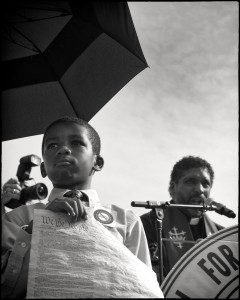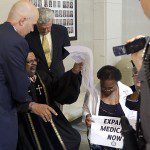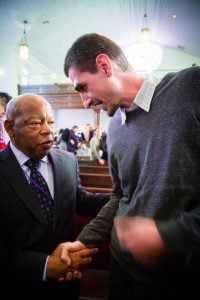 For the tenth consecutive Monday in North Carolina, thousands of people got off work and drove to our state legislature building today to join the Forward Together Movement. A mobilization that grew out of our state NAACP chapter’s grassroots organizing through the HKonJ coalition, it is an impressive crowd. This is why the Washington Post and the New York Times have sent correspondents; it’s why NPR’s microphones and satellite trucks from Fox News and MSNBC have been parked alongside the local TV news affiliates for the past few weeks. It’s why, today, this homegrown movement from North Carolina was featured in The Times of London.
For the tenth consecutive Monday in North Carolina, thousands of people got off work and drove to our state legislature building today to join the Forward Together Movement. A mobilization that grew out of our state NAACP chapter’s grassroots organizing through the HKonJ coalition, it is an impressive crowd. This is why the Washington Post and the New York Times have sent correspondents; it’s why NPR’s microphones and satellite trucks from Fox News and MSNBC have been parked alongside the local TV news affiliates for the past few weeks. It’s why, today, this homegrown movement from North Carolina was featured in The Times of London.
The cry of Moral Monday has echoed around the globe. But by next Monday—or, perhaps, the Monday after that—the NC General Assembly will adjourn. And Moral Mondays will end.
Where, then, do we go from here?
While Rev. Barber and the NC NAACP have offered exemplary leadership throughout this campaign, it would be a betrayal of the “we” that Rev. Barber constantly comes back to for each of us to not take responsibility for this conversation.
“Where do we go from here?” is not a question we can wait for someone else to answer. We must begin small group conversations in the crowd toward the common future we’re each eager to find.
Here, then, are a few thoughts with which to begin the conversation.
1) Moral Mondays have grabbed the attention of the world because they symbolize the beloved community we say we want in North Carolina. More than “protests,” our gatherings have been celebrations that another way is possible. Yet, they have like a worship service or revival meeting only lasted for a few hours. How, then, can we embody in our home communities the beloved community we’ve seen in Raleigh?
2) Mobilizations wake people up, but it takes organizing to effect genuine social change. Basic to all grassroots organizing is the recognition that what I want is tied to what my neighbor wants. How, then, do we listen more closely to what the people of North Carolina really want? How do we build up a genuinely democratic populism that cannot be bought out by big money or divide and conquer strategies?
3) What will continue to inspire us to choose sacrifice over consumption? Through direct action and civil disobedience, thousands of North Carolinians have been baptized into the Movement, putting time, money, and even their bodies on the line? What does daily sacrifice to become the communities we want to be look like going forward? And what commitments will sustain us for the long, hard work of building up a new society in the shell of the old?
Our answers to these questions are not treatises to write, but lives to be lived. We must find them as we walk forward together. But we need spaces to have the critical conversations that sustain the Movement.
May this be one of them.











